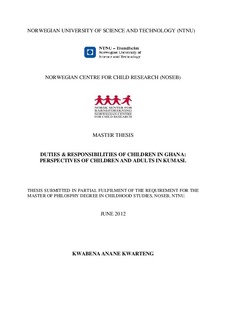Duties & Responsibilities of Children in Ghana: Perspectives of Children and Adults in Kumasi
Master thesis
Permanent lenke
http://hdl.handle.net/11250/269055Utgivelsesdato
2012Metadata
Vis full innførselSamlinger
Sammendrag
International children’s rights actors and activists view children and childhood as a special time set aside for school and play without due regard to the duties and responsibilities borne in society. In this way, children under 18 years are characterised by the ideal of the work-free childhood which is now infiltrating notions of proper childhood in many countries including Ghana. On the contrary, children in Ghana are valued for their socio-economic roles and duties that they undertake within the family. As a result, the study aimed at exploring views of children and adults on the duties and responsibilities of children in Ghana. It draws inspiration from the Social Studies of Children and Childhood which proposes children as social actors and active participants in their own lives and in the society. Therefore, this study positioned children as competent social actors and involved them as the principal research participants. As a qualitative study, data were collected using multiple participatory methods such as semi-participant observations, focus groups, story writings, and semi-structured interviews. The fieldwork was conducted in a Junior High school in Kumasi with six boys and six girls as young participants as well as six teachers in the same school. In addition, six parents were interviewed as part of the adult participants.
At the heart of the thesis is the gap between rights-based policy discourse that empower children as right-holders and the actual lived experiences of children where they are dutiful human beings. In Ghana, children fulfil multiple roles and duties that are shaped by age, gender, competence, and social maturity. Consequently, they grow up holding multi-faceted responsibilities which they execute within the family. They do not only carry out domestic activities such as cooking, washing utensils, cleaning and so on. But some children especially those from poor families contribute immensely to family income. Children’s perspectives of responsibilities revealed that they appreciate and are appreciated by their families for fulfilling their childhood duties. The study also depicted that poverty coupled with unemployment made a lot of families vulnerable. Therefore, children are required to engage in economic activities to raise money for the survival of the family. Culturally, three values that sufficed from the research were respect, reciprocity and responsibility. These values underlie adult-child relationships and sense of responsibility in Ghana, and create interdependencies within the family. In this context, children do not see themselves as autonomous individuals but as part of the family. Lastly, the study showed that children are able to integrate the three activities in their childhood namely; work, play and school.
